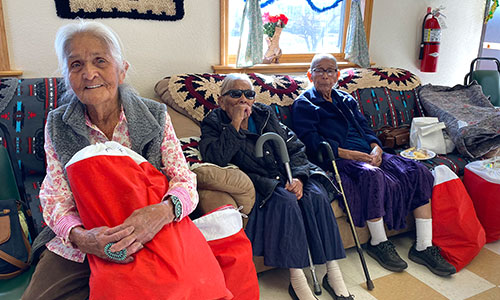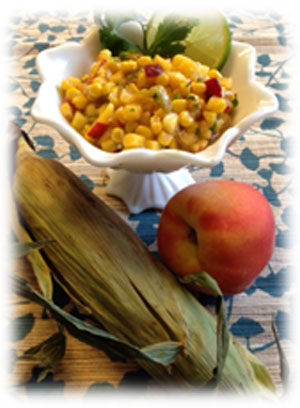Food Is Medicine
 It’s been over 8 months since SWRA staff sat among Elders at the Cameron Senior Center during their pre-holiday meal and events.
It’s been over 8 months since SWRA staff sat among Elders at the Cameron Senior Center during their pre-holiday meal and events.
The COVID-19 pandemic has brought an even more glaring light, one with laser-beam precision — on the challenges faced by tribal communities and their access to food. Most of the communities supported by Southwest Reservation Aid’s (SWRA) Standard Food service are in food deserts, where low income and low access intersect with devastating health consequences.
The SWRA food partners have gone from cooks to essential personnel keeping Elders nourished through a pandemic. Centers are closed to congregate meals and home delivery is contactless — typically leaving meals at Elders doors, with a wave and a masked covered smile. The pandemic has forced communities to isolate when they are already geographically remote. The food these workers deliver is the connection between the center and home and can help Elders heal so when the time comes to return to a different normal, they are healthy.
Elders at the Cameron Senior Center miss congregating for their meals and special events. The Elders miss gathering in a living room watching old westerns, giggling at the “Indian” actors with their fake wigs. They miss sitting on the floor cleaning a bag of wool relinquished by one of their sheep so a beautiful rug can be woven on their loom at home. They miss being seated in front of a humming sewing machine stitching fabric to become a blanket to sell or gift to someone special while, in the background, all the familiar smells are escaping from the kitchen. Traditional recipes are always a favorite among the seniors (and visiting SWRA staff) and ancestral food and medicines are important to feed and heal nations. Ingredients grown and harvested locally can not only combat the challenges of a food desert but can also fight diseases that have plagued Indian communities since colonizers arrived.
 Locally grown food helps communities become more sustainable and can help fight diseases.
Locally grown food helps communities become more sustainable and can help fight diseases.
Blue corn, beans, squash, cactus, berries, chilis, and much more are all celebrated with stories, preparation, and cooking. Communities are mobilizing their experts: Elders, historians, indigenous horticulturalists, ethnobotanist foragers, and more to sharing their food knowledge to build upon the concept that Food is Medicine. Now, more than ever, our communities need these types of options to build strong, self-sufficient communities. SWRA, with the support of our friends, donors, and Program Partners, is proud to help with all these efforts, through regular deliveries of food staples helping the cooks to prepare traditional foods, but also has capacity building and community investment projects supporting grassroots efforts to become food sovereign.
The Whiteriver Elderly Services expressed their gratitude at receiving their Standard food delivery in June:
“The food items are used to make traditional foods — beans, tortillas, etc. Due to the increase of clientele, the food items were very helpful in feeding more tribal elders. With a limited department budget, the Center was not able to feed elders, but when the SWRA food arrived the Center was able to feed more elders.”
 Traditional recipes are a favorite among elders and visiting SWRA staff.
Traditional recipes are a favorite among elders and visiting SWRA staff.
Lynn, a Train-The-Trainer (T3) participant at one of the capacity building sessions featuring traditional food knowledge said:
“Eating more like my ancestors brings me wellness, peace, self-acceptance, love, and appreciation of nature and food. So, not only is this assisting in great physical health, but also mental, psychological, sensory, and emotional. It has been so beneficial for me both personally and professionally."
Big problems require big solutions and by partnering with communities — not just by providing food, but supporting local efforts to expand traditional knowledge, communities can heal and be in a better position to combat the next pandemic.
In the spirit of sharing food knowledge, here is one recipe that celebrates some traditional food items that you can recreate at home:

Corn & Peach Salsa
This Salsa is great with grilled chicken, pork or fish. It also serves as a refreshing alternative to traditional salsa.
- 4 peaches, diced
- 4 ears of corn
- 1 sm. can diced green chiles (or jalapenos if you like your salsa spicy)
- 1/4 cup fresh cilantro, chopped
- 1/2 med. sweet onion or red onion, diced
- 1 small lime, juiced
- 2 dashes hot sauce
Wash and dry peaches. Depending on preference, the skins can remain on or peeled. (Leaving the skin on provides some good texture.) Chop the peaches and place in a bowl.
You can either grill the corn in the husk or boil the corn. Once cooked, trim the corn from the cob and mix the corn with chopped peaches. (Frozen or canned corn will also work.)
Mix in the chopped cilantro, chopped onion, lime juice, hot sauce and season with salt and pepper to taste.
Due to social distancing, stay-at-home orders, and most importantly, concern for the health of our Native Elders, the photos above were taken pre-pandemic and repurposed for the use of this story. Thank you for understanding.